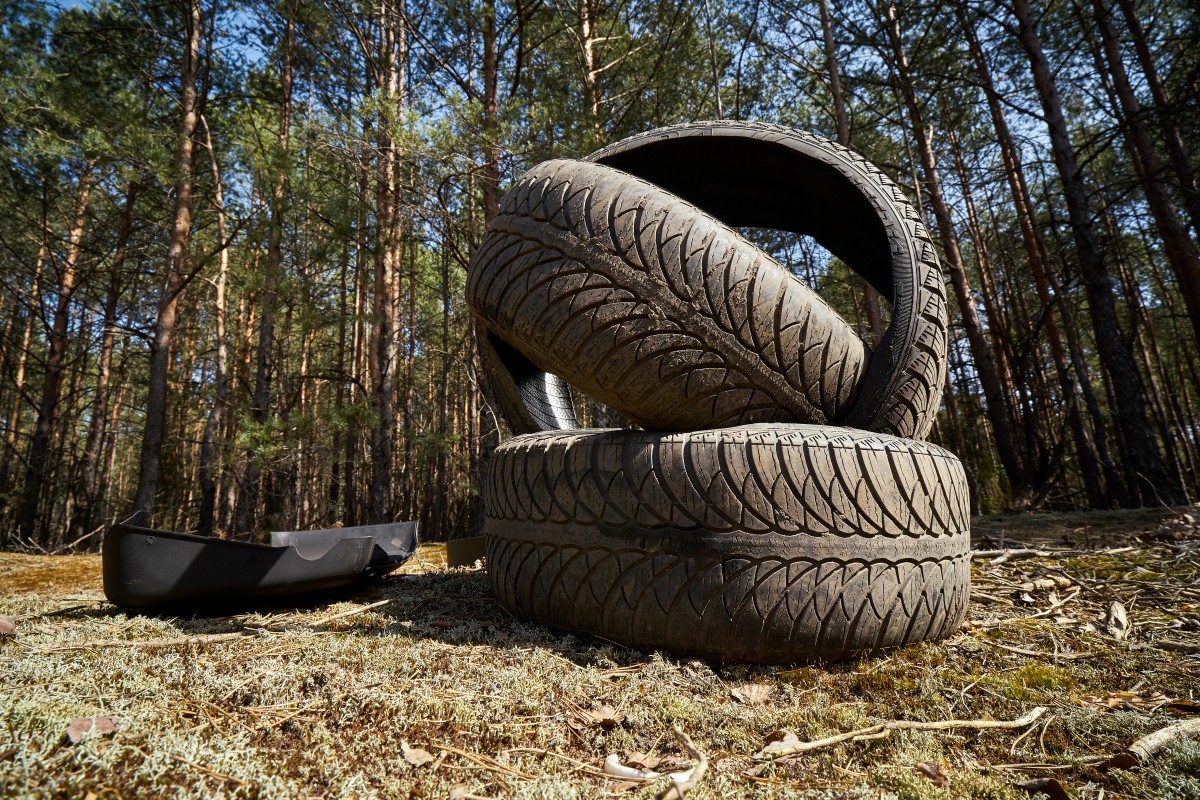A public opinion survey carried out this year revealed that 6% of Lithuanian residents take their tyres with them when they are no longer fit for use, ignoring calls to leave them at tyre change or purchase points. Later, such wastes have to be transported to waste collection sites independently, and not all drivers do this – thousands of such wastes end up on the country's roadsides, in forests and water bodies. The handling of these stray tyres is organized by municipalities, using the funds of the Ministry of Environmental Protection's Waste Prevention and Management Program – this year it cost the state a third of a million euros.
"There are more than 1.6 million registered passenger cars in Lithuania. When you take into account the fact that most drivers have separate sets of winter and summer tyres, and when you include other vehicle categories, the number of tyres in circulation is impressive – over 10 million. In this context, even one per cent of this waste that is not properly managed becomes a significant environmental burden. The number of stray tyres collected nationwide and the amount of public support for their handling show that the problem of tyre mismanagement still exists," Paulius Repšys, Development Director of Žalvaris, says.
Once in the environment, he says, tyres only take 120 years or more to decompose. It is estimated that tyres account for as much as a tenth of all microplastics entering the world's oceans. Tyres can also cause fires by releasing a wide range of harmful substances into the environment when they burn and are difficult to extinguish. Recycled tyres, on the contrary, are increasingly becoming an industrial raw material or a new energy source, with additional savings in production costs and the preconditions for a circular economy.
According to the specialist, for the convenience of drivers, tyres are collected by tyre changers or tyre shops. Responsible residents also have the option of delivering their old tyres to municipal bulky waste collection sites, which can take up to 4 or 5 unusable tyres a year free of charge per resident, depending on the specific municipality. There are currently almost 100 bulky waste collection sites in Lithuania, the contact details of which can be found on the website of municipalities or of the Environmental Protection Agency.
Handling of tyres from the pocket of all of us
This year, the State Forestry Enterprise, the Lithuanian Road Administration and 14 municipal administrations have applied for grants for the collection and handling of stray tyres. The amount of more than EUR 340,000 applied for reimbursement will be used to dispose of almost 2,000 tonnes of stray tyres. Support for the management of this waste is provided by the Environmental Projects Management Agency (EPMA).
The maximum grant per applicant is EUR 60,000.
"As the number of cars in our country is constantly increasing, we have to deal with the related problem – the problem of hazardous waste generated during the operation of vehicles, as well as tyres. Every tyre thrown away in the wrong place not only harms the environment, but also drains the budget. Therefore, it is necessary to promote responsible behaviour of businesses and drivers by encouraging them properly to use the well-developed waste collection and management system in Lithuania," Mr Repšys says.
Every tyre that is improperly disposed of or burned is an offence punishable by administrative liability and a fine of up to EUR 2,900 for natural persons and up to EUR 6,000 for legal entities. The offender is also liable for environmental damages.
"Drivers are reminded that the most convenient place to drop off old parts and spilled fluids is at the car repair shop where the car is being serviced. For this, you should choose a reputable car repair shop that has a contract with a waste manager, so you can be sure that your car waste will be properly treated or recycled. This is especially relevant when it comes to tyres – the fee for handling of waste tyres is already included in the selling price of the tyre, while if they are thrown away into the environment, the price is paid twice – by buying the tyres and by covering the costs of the waste handlers for the clean-up of the polluted areas," Mr Repšys said.
The specialist reminds that according to the Lithuanian legislation, all car repair shops are obliged to register the quantities of waste delivered to waste handlers in the Unified Product, Packaging and Waste Record Keeping Information System (GPAIS). Therefore, it is advisable to check whether the car repair shop you have chosen accounts for the generated waste in the GPAIS, if not – it probably do not take care of the waste properly.
Opportunity for drivers to get some of their money back
Drivers also benefit from using transparent car repair shops for another reason – to get some of the money they have paid for car repairs back and to encourage legal and responsible business. Residents who have paid for car repairs and kept proof of payment can get a refund of up to EUR 400 of the paid personal income tax (PIT) when declaring their income and filling in form PRC912 next year.
"If it turns out that repairs – mechanical, bodywork, electronics, injection systems or other major repairs – are also needed to prepare your car for the winter, drivers may be able to refund some of the paid PIT. For this, it is necessary to obtain and keep a document supporting the provision of the services: a sales receipt, a scanned or photographed invoice or VAT invoice. These documents for the previous year must be submitted by 15 February of the following year", Mr Repšys says.


